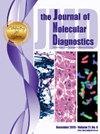分析社区-学术混合医疗系统中疑似骨髓增生性肿瘤的分子检测。
IF 3.4
3区 医学
Q1 PATHOLOGY
引用次数: 0
摘要
检测 JAK2、MPL 和 CALR 基因的体细胞突变是诊断骨髓增生性肿瘤(MPN)的关键因素。这可能无意中导致了越来越多的人要求通过检测来排除 MPN,包括检测前概率较低的临床情况。本文研究了通过新一代测序(NGS)进行的 JAK2、MPL 和 CALR 检测,旨在制定实用指南,提高检测的使用效率和效果。研究人员检索了 2015 年至 2022 年 3 月间接受检测的 1482 例患者的 NGS 结果,以及 NGS 之前 90 天内进行的相应骨髓活检和全血细胞计数结果,其中 245 例(16.5%)患者的 JAK2、MPL 或 CALR 基因致病性变异呈阳性。研究结果显示,阳性病例的比例随患者年龄的增长而增加,阳性与阴性患者的红细胞计数和血小板计数在统计学上有显著差异。利用这些因素,构建了简单的算法来预测阳性结果,最大灵敏度为 91%,同时可能排除 28% 的阴性检测结果。然而,这些模型仍未能识别出约 9% 的 MPN 患者。在这些漏检患者中,许多人患有原发性骨髓纤维化或骨髓增生异常综合征/MPN。考虑用一个简单的分流模型来帮助指导多发性骨髓瘤检测,可能是一种更具成本效益的方法,尤其是如果能进一步减少漏检患者的话。本文章由计算机程序翻译,如有差异,请以英文原文为准。
Analysis of Molecular Testing for Suspected Myeloproliferative Neoplasm at a Hybrid Community-Academic Health System
Testing for somatic mutations in JAK2, MPL, and CALR genes is critical in the diagnosis of myeloproliferative neoplasms (MPNs). However, this testing may have inadvertently led to increased requests to rule out MPN, including clinical situations with low pretest probability. This article examines JAK2, MPL, and CALR testing by next-generation sequencing (NGS) with the goal of formulating practical guidelines to make test use more efficient and effective. NGS results from 1482 patients tested between 2015 and March 2022 were retrieved, along with corresponding bone marrow biopsies and complete blood cell count results performed within 90 days before NGS, and 245 cases (16.5%) were positive for pathogenic variants in JAK2, MPL, or CALR genes. The findings showed an increase in the proportion of positive cases with patient age, and a statistically significant difference in red blood cell counts and platelet counts among patients with positive versus negative results. Using these factors, simple algorithms were constructed to predict positive results with a maximum sensitivity of 91%, while potentially eliminating 28% of negative test results. However, these models still failed to identify approximately 9% of patients with MPNs. Among these missed patients, many had either primary myelofibrosis or myelodysplastic syndrome/MPN. Considering a simple triage model to help guide MPN testing could represent a more cost-effective approach, particularly if missed patients could be further reduced.
求助全文
通过发布文献求助,成功后即可免费获取论文全文。
去求助
来源期刊
CiteScore
8.10
自引率
2.40%
发文量
143
审稿时长
43 days
期刊介绍:
The Journal of Molecular Diagnostics, the official publication of the Association for Molecular Pathology (AMP), co-owned by the American Society for Investigative Pathology (ASIP), seeks to publish high quality original papers on scientific advances in the translation and validation of molecular discoveries in medicine into the clinical diagnostic setting, and the description and application of technological advances in the field of molecular diagnostic medicine. The editors welcome for review articles that contain: novel discoveries or clinicopathologic correlations including studies in oncology, infectious diseases, inherited diseases, predisposition to disease, clinical informatics, or the description of polymorphisms linked to disease states or normal variations; the application of diagnostic methodologies in clinical trials; or the development of new or improved molecular methods which may be applied to diagnosis or monitoring of disease or disease predisposition.

 求助内容:
求助内容: 应助结果提醒方式:
应助结果提醒方式:


